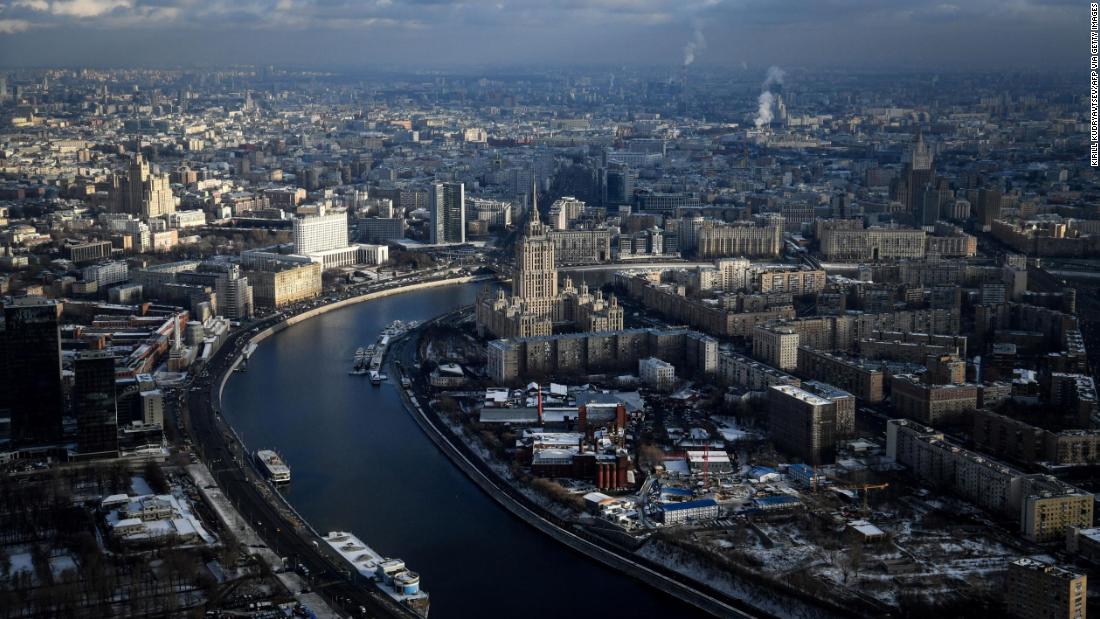Russia moved up to Level 4, the CDC’s highest-risk category, along with three other countries
On Monday afternoon, the world’s largest country by area (covering more than 17 million square kilometers or 6.6 million square miles), moved up to Level 4, the agency’s highest risk category. It was previously listed as Level 3, or “high” risk for Covid-19.
Belgium was also among a handful of destinations added to the Level 4 category.
Destinations that fall into the “Covid-19 Very High” Level 4 category have had more than 500 cases per 100,000 residents in the past 28 days, according to CDC criteria.
People should avoid traveling to locations designated with a “Level 4” notice, the CDC recommends. Anyone who must travel should be fully vaccinated first, the agency advises.
An aerial view of the Moskva River and downtown Moscow in November 2018. Russia has been deemed “very high” risk for travel by the CDC.
Kirill Kudryavtsev/AFP via Getty Images
A total of four destinations moved to Level 4 on November 1:
• Belgium
• Burkina Faso
• Russia
• Slovakia
Popular favorites remaining on Level 4
A view of Bonis Windmill and the Old Port of Mykonos, Greece. This popular vacation nation remains at the CDC’s Level 4.
Byron Smith/Getty Images
Many popular international vacation spots remained lodged at this highest level of alert, evidence of Covid-19’s continuing grip. There were nearly 80 countries at Level 4 as of November 1. The current list of Level 4 destinations includes:
• Austria
• Barbados
• Botswana
• Croatia
• Greece
• Ireland
• Maldives
• Switzerland
• Thailand
• Turkey
• United Kingdom
In the case of the UK, it’s been lodged at Level 4 since July 19. Greece has been there since August 2. Thailand has been there since August 9.
New entries on Level 3
The Level 3 category — which applies to destinations that have had between 100 and 500 cases per 100,000 residents in the past 28 days — had four updates this week:
• Fiji
• Jamaica
• Laos
• Poland
Being placed in Level 3 was a sign of progress in Fiji and Jamaica, which both moved down from Level 4.
For Poland, the move to Level 3 was a sign of worsening conditions. The eastern European nation had been at Level 2 (“moderate” risk). Laos was previously listed in the CDC’s “unknown” category due to a lack of information.
There are other factors for travelers to consider beyond the Covid-19 incidence rates that figure prominently in the CDC’s travel notices, according to CNN Medical Analyst Dr. Leana Wen.
“The transmission rates are one guidepost. Another is what precautions are required and followed in the place that you’re going and then the third is what are you planning to do once you’re there,” said Wen, an emergency physician and professor of health policy and management at the George Washington University Milken Institute School of Public Health.
“Are you planning to visit a lot of attractions and go to indoor bars? That’s very different from you’re going somewhere where you’re planning to lie on the beach all day and not interact with anyone else,” said Wen, who is also author of a new book, “Lifelines: A Doctor’s Journey in the Fight for Public Health.”
Most importantly, travelers should be vaccinated, she said.
Some options in Level 2
There were no additions to the Level 2 category this week. Destinations carrying the “Level 2: Covid-19 Moderate” designation have seen 50 to 99 Covid-19 cases per 100,000 residents in the past 28 days.
Popular destinations in this less risky category on November 1 included the following:
• Colombia
• Peru
• India
Keep in mind the CDC list updates weekly, and the situation in any country can change for better or worse from week to week.
Level 1 and no ratings
Finally, as mentioned above, there are destinations for which the CDC has an “unknown” risk because of a lack of information. As of November 1, that included Monaco, the Azores and Tanzania.
“Fully vaccinated travelers are less likely to get and spread Covid-19. However, international travel poses additional risks, and even fully vaccinated travelers might be at increased risk for getting and possibly spreading some Covid-19 variants,” the agency said.
![]()


